Unit 8 - 厦门大学外文学院
- 格式:ppt
- 大小:223.50 KB
- 文档页数:45

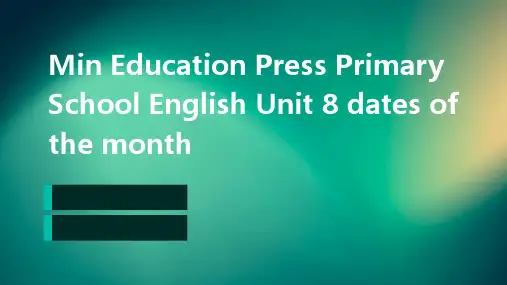
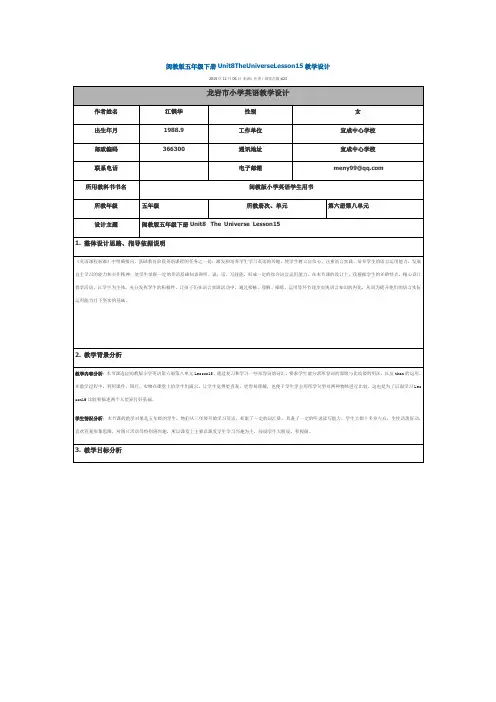
闽教版五年级下册Unit8TheUniverseLesson15教学设计2015年11月06日来源: 作者: 浏览次数:623师生互致问候。
T: Hello, boys and girls. Nice to meet you! Ss: Nice to meet you, too.T:My name is ….What’s your name? S1: My name is XXX.T: What’s your favorite sport? S1: My f avorite sport is …..T: What do you want to be ? S1:I want to be….……..设计意图:通过与学生自由谈话,拉近了师生间的距离。
同时也巩固了前面所学的知识,充分调动学生脑海中的知识储备,提高学生英语口语水平。
二、复习导入(1)复习形容词。
教师出示图片, 复习 big, small, old, long形容词,并引导学生注意这四个形容词的音、形、义。
For example(出示课件)T; What’s this?Ss: It’s a basketball.T: What’s this?Ss: It’s a ping-pong.T: The basketball is ?(做动作). Ss: The basketball is big.T: And the ping-pong is ? (做动作)Ss: The ping-pong is small.(板书big-small)……同法,教师出示慢羊羊与懒洋洋的图片,由old引出反义词young,(板书并教学young )并让学生边读边做动作;接着教师拿出两根长度不一的铅笔,由long引出反义词sho rt(板并教学short)。
(2)活动——唱反调(出示PPT)教师伴随着音乐拍掌(拍掌两下说I say,桌上拍两下说big)说I say big, 学生跟着拍掌说I say small, 教师拍掌说big, 学生拍掌说small; 教师拍掌说:I say young,学生拍掌说I say old,教师拍掌说young, 学生拍掌说old. (背景音乐为we will rock you.)(3)板书课题—Unit 8 Lesson15。
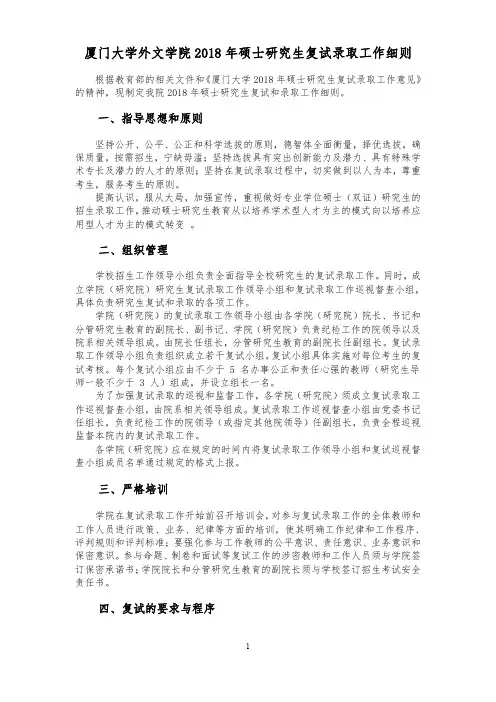
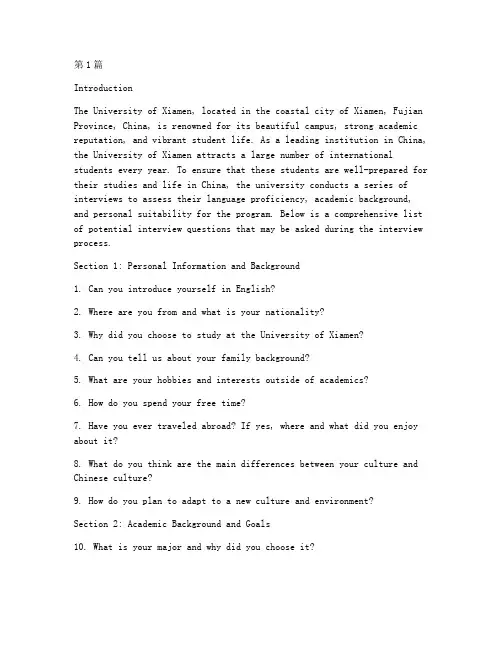
第1篇IntroductionThe University of Xiamen, located in the coastal city of Xiamen, Fujian Province, China, is renowned for its beautiful campus, strong academic reputation, and vibrant student life. As a leading institution in China, the University of Xiamen attracts a large number of international students every year. To ensure that these students are well-prepared for their studies and life in China, the university conducts a series of interviews to assess their language proficiency, academic background, and personal suitability for the program. Below is a comprehensive list of potential interview questions that may be asked during the interview process.Section 1: Personal Information and Background1. Can you introduce yourself in English?2. Where are you from and what is your nationality?3. Why did you choose to study at the University of Xiamen?4. Can you tell us about your family background?5. What are your hobbies and interests outside of academics?6. How do you spend your free time?7. Have you ever traveled abroad? If yes, where and what did you enjoy about it?8. What do you think are the main differences between your culture and Chinese culture?9. How do you plan to adapt to a new culture and environment?Section 2: Academic Background and Goals10. What is your major and why did you choose it?11. Can you describe your academic achievements in high school or previous education?12. What are your strengths and weaknesses as a student?13. How do you handle stress and pressure in your studies?14. Have you participated in any extracurricular activities or community service during your studies? If yes, what were they?15. What are your academic goals for the next few years?16. How do you plan to utilize your degree after graduation?17. Are there any specific courses or professors at the University of Xiamen that you are interested in?18. What are your expectations for the academic environment at the University of Xiamen?Section 3: Language Proficiency19. How long have you been studying English?20. What is your proficiency level in English, according to the Common European Framework of Reference for Languages (CEFR)?21. Can you describe a challenging situation where you had to use English and how you dealt with it?22. How do you improve your English language skills?23. Do you have any experience in English-speaking environments or cultures?24. How would you rate your listening, speaking, reading, and writing skills in English?25. What are your strategies for overcoming language barriers?Section 4: Motivation and Reasons for Applying26. Why do you want to study in China?27. What do you think are the advantages and disadvantages of studyingin a different country?28. How do you plan to contribute to the diversity of the University of Xiamen?29. Can you describe a time when you had to work in a team with people from different backgrounds?30. What are your expectations for the university's cultural exchange programs?31. How do you plan to engage with Chinese students and the local community?32. What are your long-term career aspirations and how does studying at the University of Xiamen align with them?33. Why do you think you are a good fit for the University of Xiamen?Section 5: Challenges and Adaptation34. What challenges do you anticipate facing while studying in China and how do you plan to overcome them?35. How do you deal with homesickness or feelings of isolation?36. What are your expectations regarding the university's support for international students?37. How do you plan to balance your academic responsibilities with personal life and social activities?38. Can you describe a situation where you had to adjust to a new environment and what you learned from it?39. How do you maintain a healthy lifestyle while studying abroad?40. What are your thoughts on the importance of cross-cultural communication and collaboration?Section 6: Additional Questions41. Do you have any questions for us?42. Can you provide any additional information about your application or personal experiences?43. What do you think is the most important skill for a successful student?44. How do you prioritize your tasks and manage your time effectively?45. Can you describe a leadership experience you have had and what you learned from it?46. What are your thoughts on the role of technology in education?47. How do you plan to stay connected with your family and friends back home?48. What are your expectations for the Chinese education system?49. How do you think studying at the University of Xiamen will benefit your future career?50. What advice would you give to a prospective international student considering studying in China?This comprehensive list of interview questions is designed to provide a framework for the University of Xiamen's interview process. While the actual questions may vary, these questions will help candidates prepare for the interview and demonstrate their suitability for the program. Good luck with your application!第2篇IntroductionXiamen University, located in the beautiful coastal city of Xiamen, China, is renowned for its academic excellence and vibrant campus life. As part of the admission process for international students, a comprehensive English interview is conducted to assess the candidate's language proficiency and suitability for the program. Below is acomprehensive list of potential interview questions that may be asked during the English interview at Xiamen University.Section 1: Introduction and Background1. Can you tell us a little about yourself?2. Why did you choose to apply to Xiamen University?3. What are your academic interests?4. Can you describe your educational background?5. What are some of the most significant challenges you have faced in your academic journey?6. How do you think your previous experiences have prepared you for studying at Xiamen University?7. What are your long-term career goals?8. How do you plan to contribute to the academic community at Xiamen University?9. Can you share any extracurricular activities or hobbies you are involved in?10. What do you like to do in your free time?Section 2: Language Proficiency11. Why do you think English is important in today's globalized world?12. Can you describe a situation where you had to use English in a real-life context?13. How would you describe your level of English proficiency?14. What are your strengths and weaknesses in English?15. Can you tell us about a book or movie that you recently watched or read in English?16. How do you approach learning a new language?17. What are some challenges you have faced while learning English?18. How do you stay motivated to improve your English skills?19. Can you explain the difference between formal and informal English?20. What are some common English idioms or phrases that you use frequently?Section 3: Academic and Professional Skills21. What research projects or papers have you worked on?22. How do you approach problem-solving in your academic work?23. Can you describe a time when you had to work as part of a team?24. What are your strengths and weaknesses in team projects?25. How do you handle stress or pressure in academic or professional settings?26. What are some strategies you use to manage your time effectively?27. Can you explain a complex concept or theory in your field using simple English?28. How do you stay updated with the latest developments in your field?29. What are your thoughts on the importance of lifelong learning?30. How do you approach writing academic papers or reports?Section 4: Cultural Awareness and Adaptability31. How would you describe your cultural background?32. Can you share an experience where you had to adapt to a new culture?33. What are your thoughts on cultural diversity?34. How do you think cultural differences can impact communication?35. What are some challenges you might face as an international student in China?36. How do you plan to overcome these challenges?37. Can you tell us about a time when you had to work with someone froma different cultural background?38. How do you approach cultural misunderstandings or conflicts?39. What are your thoughts on cross-cultural collaboration?40. How do you think your cultural background will contribute to your studies at Xiamen University?Section 5: Specific Program-related Questions41. Can you tell us about your chosen major or program?42. What do you hope to learn from this program?43. How do you plan to apply what you learn in your future career?44. What are some of the most interesting courses you have taken or would like to take?45. How do you think your program of study will help you achieve your career goals?46. What are some of the key skills you hope to develop during your time at Xiamen University?47. How do you plan to engage with the faculty and staff at Xiamen University?48. What are your expectations of the academic environment at Xiamen University?49. How do you plan to integrate into the student community at Xiamen University?50. Can you tell us about any specific clubs or organizations you are interested in joining?ConclusionThe English interview at Xiamen University is designed to assess a candidate's overall language proficiency, academic abilities, cultural awareness, and adaptability. By thoroughly preparing for the questions outlined above, candidates can demonstrate their suitability for the program and their enthusiasm for studying at Xiamen University. Good luck!---Note: The above questions are meant to provide a comprehensive guide for candidates preparing for the English interview at Xiamen University. The actual interview may include additional questions or focus on different aspects of the candidate's background and skills.第3篇IntroductionXiamen University, located in the scenic coastal city of Xiamen, China, is renowned for its beautiful campus and strong academic programs. As a prestigious institution, Xiamen University attracts candidates from all over the world. To ensure that candidates possess a high level of English proficiency, the university has developed a comprehensive interview process. Below are a variety of English interview questions that candidates might encounter during their interview at Xiamen University.Section 1: Introduction and Background1. Can you tell us a little about yourself?2. Where are you from, and what do you enjoy most about your home country?3. What motivated you to apply to Xiamen University?4. Can you describe your educational background and any notable achievements?5. How did you prepare for this interview?6. What do you know about Xiamen University and its programs?7. Why do you think you would be a good fit for your chosen program?8. Can you tell us about a challenging experience you have overcome?9. How do you handle stress or pressure in your personal or academic life?10. What are your long-term career goals, and how does Xiamen University fit into your plan?Section 2: Language Proficiency11. What is your native language, and how long have you been learning English?12. Can you describe a situation where you had to use English in a professional or academic setting?13. How would you describe your level of English proficiency (e.g., reading, writing, speaking, listening)?14. What are your strengths and weaknesses in English?15. Can you give an example of a book, movie, or TV show you have recently watched or read, and how it affected you?16. How do you stay updated with current events or news in English?17. Can you summarize a recent article or news report in English?18. What is your favorite English language song or poem, and why?19. How do you feel about using English in an academic environment?20. Can you describe a time when you had to use English to communicate with someone who spoke a different language?Section 3: Critical Thinking and Problem-Solving21. Describe a complex problem you have faced and how you solved it.22. What are your views on the importance of critical thinking in your field of study?23. How do you approach research, and what sources do you use to gather information?24. Can you give an example of a time when you had to work under a tight deadline?25. What is your approach to decision-making, and how do you weigh different options?26. How do you handle conflicts or disagreements with peers or colleagues?27. Can you explain a concept or theory that is relevant to your field of study?28. What are some emerging trends in your field, and how do you think they will impact the future?29. How do you stay informed about new developments in your field?30. Can you discuss the ethical implications of your chosen field?Section 4: Communication and Interpersonal Skills31. Describe a situation where you had to communicate a difficult message to someone.32. How do you handle feedback or criticism, both positive and negative?33. What are your strengths in team projects or group work?34. Can you give an example of a time when you had to work with someone who had a different working style?35. How do you build rapport and maintain relationships with colleagues or clients?36. What is your approach to public speaking or presentations?37. How do you handle stress or nervousness during a presentation?38. Can you describe a successful collaboration you have been a part of?39. What are your communication preferences (e.g., in-person, email, phone)?40. How do you ensure effective communication in a diverse team?Section 5: Adaptability and Cultural Awareness41. Describe a time when you had to adapt to a new environment or culture.42. How do you handle cultural differences or misunderstandings in a professional setting?43. What are your views on globalization, and how does it affect your field of study?44. Can you give an example of a cultural practice or tradition that you find interesting or unique?45. How do you incorporate cultural diversity into your work or projects?46. What are your experiences with living or studying in a different country?47. How do you maintain a balance between your personal and professional life, especially when dealing with cultural differences?48. What are your views on multiculturalism and its benefits?49. Can you discuss a global issue that is relevant to your field of study?50. How do you think your cultural background has influenced your approach to learning and problem-solving?ConclusionThese interview questions are designed to assess a candidate's English proficiency, critical thinking, problem-solving skills, communication abilities, and cultural awareness. The questions aim to provide acomprehensive understanding of the candidate's suitability for Xiamen University and its programs. Candidates should prepare thoroughly for their interview, ensuring they can confidently answer these questions and demonstrate their qualifications for the chosen program. Good luck!。
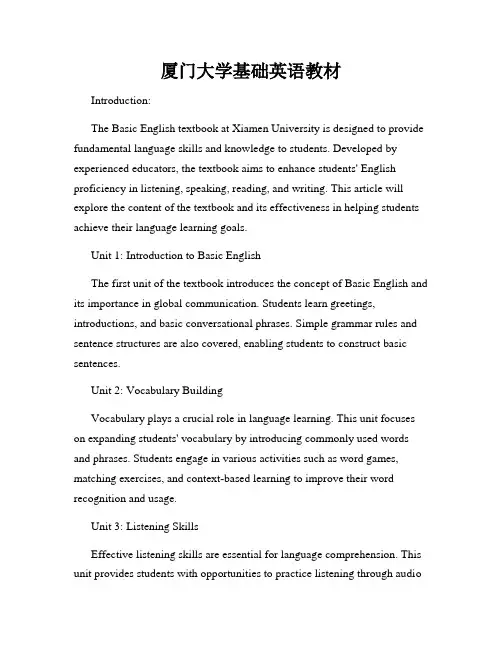
厦门大学基础英语教材Introduction:The Basic English textbook at Xiamen University is designed to provide fundamental language skills and knowledge to students. Developed by experienced educators, the textbook aims to enhance students' English proficiency in listening, speaking, reading, and writing. This article will explore the content of the textbook and its effectiveness in helping students achieve their language learning goals.Unit 1: Introduction to Basic EnglishThe first unit of the textbook introduces the concept of Basic English and its importance in global communication. Students learn greetings, introductions, and basic conversational phrases. Simple grammar rules and sentence structures are also covered, enabling students to construct basic sentences.Unit 2: Vocabulary BuildingVocabulary plays a crucial role in language learning. This unit focuses on expanding students' vocabulary by introducing commonly used words and phrases. Students engage in various activities such as word games, matching exercises, and context-based learning to improve their word recognition and usage.Unit 3: Listening SkillsEffective listening skills are essential for language comprehension. This unit provides students with opportunities to practice listening through audiomaterials, dialogues, and real-life conversations. Students develop their ability to understand different accents, extract key information, and respond appropriately.Unit 4: Speaking SkillsThe textbook emphasizes the development of speaking skills through interactive exercises and role-plays. Students learn to express themselves using correct pronunciation, intonation, and vocabulary. They engage in pair and group discussions, presentations, and debates, enabling them to communicate effectively in various situations.Unit 5: Reading ComprehensionReading comprehension is crucial for language comprehension and academic success. This unit focuses on improving students' reading skills through a wide range of authentic texts, including articles, essays, and news reports. Students learn to analyze the main idea, identify supporting details, and infer meanings from context, enhancing their overall reading proficiency.Unit 6: Writing SkillsIn this unit, students learn the fundamentals of effective writing. They practice structuring sentences, paragraphs, and essays using appropriate grammar and vocabulary. Writing activities include descriptive and narrative writing, opinion essays, and formal letters. Students receive feedback to improve their composition skills.Unit 7: Grammar and SyntaxGrammar forms the backbone of any language. This unit provides a comprehensive overview of English grammar, including tenses, parts of speech, sentence structures, and common grammatical errors. Students engage in grammar exercises and quizzes to reinforce their understanding and application of grammar rules.Unit 8: Cultural AwarenessUnderstanding different cultures is important for effective communication. This unit exposes students to aspects of English-speaking countries' culture and customs. Students learn about traditions, festivals, and etiquette, fostering cross-cultural understanding and appreciation.Conclusion:The Basic English textbook at Xiamen University offers a well-rounded approach to language learning. Its systematic structure, engaging activities, and comprehensive content enable students to develop their English skills effectively. The textbook not only enhances students' language proficiency but also cultivates their cultural awareness and communicative competence. By following this curriculum, students can lay a solid foundation in English and prepare themselves for further language learning and academic success.。

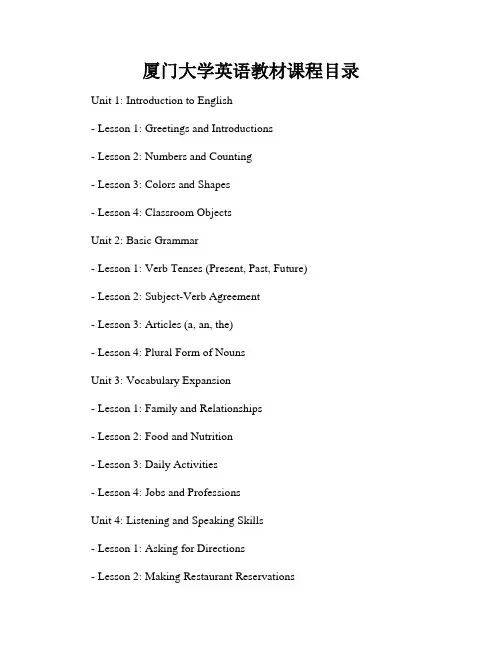
厦门大学英语教材课程目录Unit 1: Introduction to English- Lesson 1: Greetings and Introductions- Lesson 2: Numbers and Counting- Lesson 3: Colors and Shapes- Lesson 4: Classroom ObjectsUnit 2: Basic Grammar- Lesson 1: Verb Tenses (Present, Past, Future)- Lesson 2: Subject-Verb Agreement- Lesson 3: Articles (a, an, the)- Lesson 4: Plural Form of NounsUnit 3: Vocabulary Expansion- Lesson 1: Family and Relationships- Lesson 2: Food and Nutrition- Lesson 3: Daily Activities- Lesson 4: Jobs and ProfessionsUnit 4: Listening and Speaking Skills- Lesson 1: Asking for Directions- Lesson 2: Making Restaurant Reservations- Lesson 3: Discussing Travel Plans- Lesson 4: Talking about Hobbies and InterestsUnit 5: Reading Comprehension- Lesson 1: Understanding Short Stories- Lesson 2: Reading News Articles- Lesson 3: Analyzing Poems- Lesson 4: Extracting Information from EssaysUnit 6: Writing Skills- Lesson 1: Writing Formal Emails- Lesson 2: Drafting Personal Letters- Lesson 3: Composing Descriptive Essays- Lesson 4: Creating Persuasive ArgumentsUnit 7: Culture and Society- Lesson 1: Festivals and Traditions- Lesson 2: Social Etiquette and Customs- Lesson 3: Popular Sports and Recreation- Lesson 4: Famous Landmarks and Tourist Attractions Unit 8: Advanced Grammar- Lesson 1: Conditional Sentences- Lesson 2: Passive Voice- Lesson 3: Reported Speech- Lesson 4: Modal VerbsUnit 9: Business English- Lesson 1: Job Interviews and Resumes- Lesson 2: Negotiation Strategies- Lesson 3: Business Presentations- Lesson 4: Writing Professional ReportsUnit 10: Test Preparation- Lesson 1: Test Taking Strategies- Lesson 2: Practicing Reading Comprehension- Lesson 3: Reviewing Grammar Rules- Lesson 4: Writing Sample EssaysNote: The above course outline is a general guide and may be subject to changes or modifications based on the specific curriculum of the English language program at Xiamen University. Please refer to the official course materials for the most up-to-date information.。
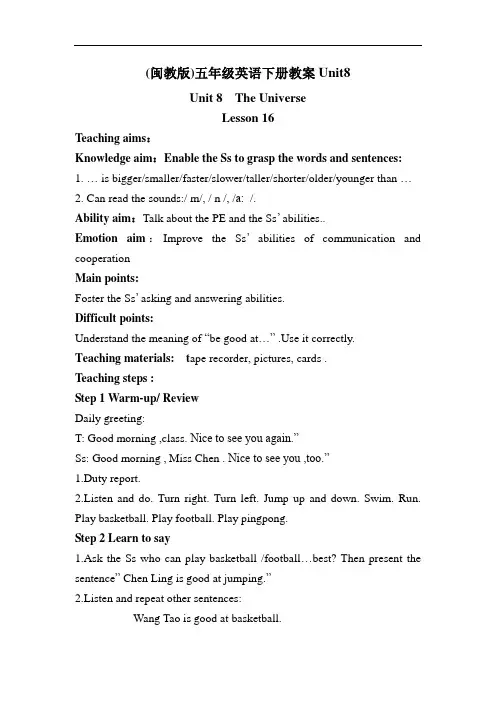
(闽教版)五年级英语下册教案Unit8Unit 8 The UniverseLesson 16Teaching aims:Knowledge aim:Enable the Ss to grasp the words and sentences:1. … is bigger/smaller/faster/slower/taller/shorter/older/younger than …2. Can read the sounds:/ m/, / n /, /а׃ /.Ability aim:Talk about the PE and the Ss’ abilities..Emotion aim:Improve the Ss’abilities of communication and cooperationMain points:Foster the Ss’ asking and answering abilities.Difficult points:Understand the meaning of “be good at…” .Use it correctly.Teaching materials: t ape recorder, pictures, cards .Teaching steps :Step 1 Warm-up/ ReviewDaily greeting:T: Good morning ,class. Nice to see you again.”Ss: Good morning , Miss Chen . Nice to see you ,too.”1.Duty report.2.Listen and do. Turn right. Turn left. Jump up and down. Swim. Run. Play basketball. Play football. Play pingpong.Step 2 Learn to say1.Ask the Ss who can play basketball /football…best? Then present the sentence” Chen Ling is good at jumping.”2.Listen and repeat other sentences:Wang Tao is good at basketball.These girls are good at pingpong.These boys are good at football.3.Listen and repeat, then practice in groups.Step 3.Ask and answer1.Let a student act, ask: Is he good at swimming? Help the Ss answer:Yes, he is/ No he isn’t.2. Ask and answerT: Is Sally good at jumpingSs: Yes, she is.T: Is she good at football?Ss: No ,she isn’t. But she’s good at pingpong.Step 4.Practice1.Listen and number.2.Groups work. Who is a sports boy/girl?3. Listen and learn the English sounds.Step 5 HomeworkListen to the tape & repeat for some times .Finish off the activity book of Lesson 16.。
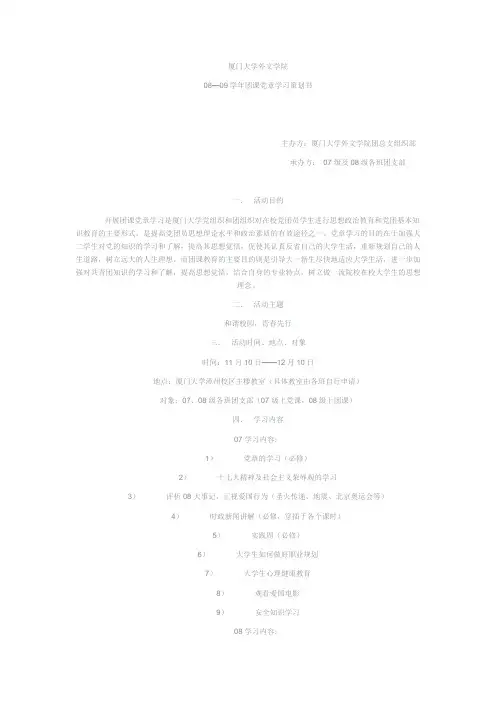
厦门大学外文学院08—09学年团课党章学习策划书主办方:厦门大学外文学院团总支组织部承办方:07级及08级各班团支部一.活动目的开展团课党章学习是厦门大学党组织和团组织对在校党团员学生进行思想政治教育和党团基本知识教育的主要形式,是提高党团员思想理论水平和政治素质的有效途径之一。
党章学习的目的在于加强大二学生对党的知识的学习和了解,提高其思想觉悟,促使其认真反省自己的大学生活,重新规划自己的人生道路,树立远大的人生理想。
而团课教育的主要目的则是引导大一新生尽快地适应大学生活,进一步加强对共青团知识的学习和了解,提高思想觉悟,结合自身的专业特点,树立做一流院校在校大学生的思想理念。
二.活动主题和谐校园,青春先行三.活动时间、地点、对象时间:11月10日——12月10日地点:厦门大学漳州校区主楼教室(具体教室由各班自行申请)对象:07、08级各班团支部(07级上党课,08级上团课)四.学习内容07学习内容:1)党章的学习(必修)2)十七大精神及社会主义荣辱观的学习3)评析08大事记,正视爱国行为(圣火传递、地震、北京奥运会等)4)时政新闻讲解(必修,穿插于各个课时)5)实践周(必修)6)大学生如何做好职业规划7)大学生心理健康教育8)观看爱国电影9)安全知识学习08学习内容:1)校史校规学习(必修)2)团章的学习(必修)3)十七大精神及社会主义荣辱观的学习(必修)4)时政新闻讲解(必修,可穿插于各个课时)5)实践周(必修)6)学习科学发展观和构建和谐社会7)观看爱国电影8)大学生心理健康教育9)安全知识学习注:各班团课党章学习的上课形式不限,各班可根据自己班级的特点采用各种新颖、活泼的形式。
五.活动流程(1)活动前期准备工作:1. 制作活动考勤及评比表(11月3日——11月6日)2. 申请外文学院组织部邮箱,以便收集各班党团课材料(xmuzuzhib@16)3. 申请外文学院组织部博客,把活动的策划等材料放上去,以便有疑问的班级更方便地了解活动情况()4. 召集各班团支书开会,布置党团课工作(5-6号)5. 通过海报宣传外文学院党团课正式开始(10号)(两张手绘海报分别贴于囊萤和凌云)6. 收集各班党团课策划以及具体上课地点(11月10日——11月11日)7. 安排各班的考勤人员(11月11日——11月13日)(2) 活动具体工作1.各班开展党团课2.组织部派人到各班上课地点考勤,并进行评分3.各班在上完每一次团课之后,负责发一份本次活动的总结和五张照片到组织部邮箱4.各班每两次团课后负责出一期海报,加大外院以及本班党团课的宣传,组织部负责收集海报张贴情况5.邀请宣传部成员负责帮我们随时跟踪报道党团课开展情况,通过网站加大我们党团课的宣传力度(3)活动后期工作1.各班负责交一份总的党团课总结(1500字以上),以及10张照片(冲洗出来)2.每位同学交一份总结(1000字以上)给团支书3.组织部负责考勤的人员对各班党团课开展情况进行总结(主要是课堂气氛、上课内容、形式和纪律等)4.活动后期宣传,结合优秀班级的照片制作一期海报(两份手绘)六.突发事件和安全考虑1. 各班教室如有生变动,由各班负责人与组织部干事联系2. 实践周期间各班要组织好本班同学,活动当天向组织部干事汇报活动进展及安全情况七.活动经费预算1. 海报(手绘)制作4张共计8元(每张以2元计算)2. 考勤表打印25份3.75元。
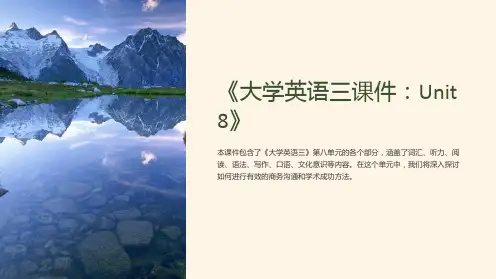
从2017看2018厦门大学外文学院考研大纲解析2018厦门大学的考研大纲还没公布,然而我们不能因为还没公布就放弃复习,那可咋办。
机智如我,当然是看2017年的考研大纲啦!每年的大纲其实变化并不是很大,大家可以根据大纲先进行复习,等到大纲正式公布后再进行调整。
2017年的考研大纲发布时间是8月26日,聚英厦大考研网提醒大家在8月份下旬要注意关注自己院校的考研大纲及大纲解析。
可以到聚英厦大考研网的大纲解析一栏去查看哦!一.2017年厦大外文学院研究生考试范围外文学院061英语语言文学系、062欧洲语言文学系、063外语教学部、064日语语言文学系、065法语语言文学系英语语言文学系和外语教学部:708写作与英汉互译:考察学生的英语写作能力(内容详实、表达流畅,无明显语法用词错误)、英译汉与汉译英的基本功。
814阅读及英美文学、语言学基础:考察学生的英语阅读能力、考察学生的英美文学和语言学方面的常识积累。
二、2017年厦大外文学院研究生初试考试科目厦大各院系招生目录(含初试考试科目):/Item-8179.aspx进去后寻找外文学院就可以看到了!三、厦大考研大纲汇总厦门大学专业课和公共课考研大纲汇总:/Default-594.aspx四、推荐厦门大学外文学院考研复习资料:/xmu/all-164其他院系资料也可以进入上面的页面选择自己想报考的院系了解。
厦门大学历年真题:/Default-39.aspx聚英厦大考研网为了方便大家进行交流学习,我们为大家创建了厦大外文学院考研群:572219258。
群里提供免费咨询,上传各种考研资料并会及时更新考研资讯,不定时举办考研讲座等活动帮助大家更好地学习,对大家的考研应该会有帮助,欢迎大家加入哦!。